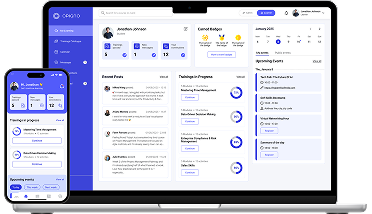Learn how a renowned luxury brand advances and scales its corporate training for thousands of employees worldwide with a completely customized LMS.

About the client
The client is a well-established luxury goods manufacturer, considered one of the most prominent brands on the market.
Over its rich, century-long history, it has grown a distribution network of mono- and multi-brand boutiques and franchises across the globe, working with over 12,000 specialists involved in various stages of sales and customer support.
The challenge
As the company creates complex and intricate luxury goods, the employees, especially client-facing ones, must know about the nuances of different product model series, new product launches, and the materials and proprietary technologies used. The company rightfully saw corporate training as a vehicle for maintaining brand integrity and global quality standards, transmitting its values, and upgrading employees' skills, but faced several issues organizing it:
The range of learners and training
Training management was complicated by the amount and diversity of the staff, as the client's distribution network embraced thousands of people across 120 countries. The geographical aspect was amplified by a wide range of specialties they wanted to accommodate, e.g., sales representatives, shop technicians, technical specialists, managerial departments, etc.
An ideal solution had to support a large and diverse knowledge base, many languages, and adaptive learning paths while ensuring congruent training across the whole network, regardless of the country or job position of the learner.
Learning accessibility
A standalone challenge was to motivate busy employees to participate in training in the first place. Initially, the company used two separate solutions for creating and distributing the learning content. However, these solutions were outdated and unresponsive, and the learners did not follow through with the courses.
The issue was all the more pressing as the company aimed to provide not just one-off courses on new products but also prolonged career path training that could last for weeks and even months. The learners required a training approach they could easily integrate into their workflow and that would stay interesting throughout the whole duration.
Technical adequacy
Powering coherent, standardized, but flexible training for thousands of employees across the globe raised specific technical requirements for a potential e-learning platform;
- It should be scalable, responsive, and secure.
- It should have comprehensive functionality — from authoring capabilities to learner management to custom performance statistics gathering.
- It should match the premium status of the brand.
- It should integrate relevant internal databases.
In 2016, the company launched an e-learning platform based on Opigno LMS 1.x that had a good run and greatly facilitated 2,000 sales representatives promoting the brand's product line over seven years. However, Opigno 1.x is built on Drupal 7, which is approaching its end of life, and the client wanted to upgrade to more modern technology, extend their toolkit with new features and a mobile app, and open the platform for multibrand boutique staff, too, essentially increasing the user base six-fold.
To build a single power source for all the company's learning and development operations and launch training for the new audiences, including multi-brand boutiques' employees, the company needed a more robust and capable e-learning platform.

Our solution
Over the years of our collaboration, the client had a chance to fully explore and appreciate the convenience of creating and managing training with Opigno LMS and the flexibility our development services provide for customizing the platform into virtually any configuration. To extend training capabilities further, the client decided to upgrade to a more powerful and modern Opigno 3.x version. The switch offered an array of serious improvements:
Custom integrations
The Opigno team integrated several internal systems with the platform that host all the databases on users, their logins, and points of sales necessary for the custom hierarchy-level statistics we mentioned above.
The platform doesn't manage user access as all the user data is hosted separately, which adds additional security and user management convenience — all the data is pulled from and managed at a single source of truth.
Mobile application and the Mini-Quiz feature
To maximize training accessibility, the Opigno team developed a mobile app version of the LMS. It serves as a perfect tool for completing a microlearning module within several minutes without disrupting work.
The app has one more way to keep learners consistently engaged — a custom-developed Mini Quiz feature with a global rank system where users can compete with everybody in solving daily international quizzes with multiple-choice questions chosen randomly on time and invite other employees in a 1vs1 contest.

Gamification
On top of mini quizzes, the Opigno team implemented other gamification features, including personalized training maps, levels, unlockable content, rewards, a rank system, and points/credits.
Each job position has a training map with unlockable courses and several difficulty levels, progressing from Beginner to Expert. Such a system provides employees with a clear overview of their long-term career path, while gradually unlocking new courses and leveling up feeds the feeling of growth and achievement. Successfully solved quizzes in each training module bring learners points that form their global ranking, incentivizing them to perform better.

